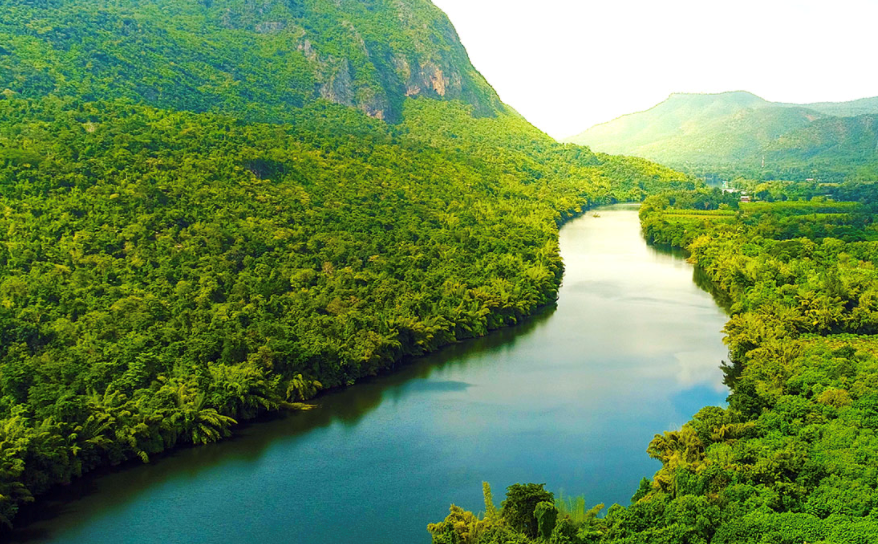DFCD to support organic spice producer Vinasamex in Vietnam
The Dutch Fund for Climate and Development intends to partner with Vietnamese-based organic spice producer Vinasamex, to support the development of the company's farming practices, biodiversity impact, community engagement and overall climate resilience as they expand operations.
Vinasamex is a Vietnamese company founded in 2012, producing high quality organic spices and spice-based products. Today, they manage over 6000 ha of organic farms and partner with over 3000 farming households, supplying the domestic and international market, namely Europe, USA and Japan. They operate in a landscape where human activity and climate change are compounding ecosystem pressures.
The project with Vinasamex has been put forward by the World Wide Fund for Nature Netherlands (WWF-NL), which, together with SNV, a global development partner, manages the DFCD's Origination Facility to develop new projects for the climate investment fund. WWF-NL intends to sign a €284,400 grant funding agreement with Vinasamex, and together with WWF Vietnam, they will carry out activities aimed at improving the company's farming practices, biodiversity impact, community engagement and overall climate resilience as they look to build a pioneering new factory.
“Vinasamex is that rare mixture of social and organic vision, a company that is not only commercially successful but focuses on the wellbeing of smallholder farmers. The company has a deep-rooted relationship with both the community and nature.”
- Stuart Beavis, DFCD Regional Lead for Asia.
A landscape at risk
North West Vietnam is one of the main regions for cultivating cinnamon, star anise, herbs, spices and fruits in the country. Its farmers, many of whom are ethnic minorities, have, in recent years, been hit by the effects of climate change - more intense storms, longer dry periods, and changing patterns of precipitation. Deforestation has led to flash flooding, landslides and water shortages. While decades of monoculture agriculture, reliance on chemical inputs, and slash-and-burn practices have led to soil degradation and increased greenhouse gas emissions. This harmful combination of climate change and human activity is also negatively impacting local biodiversity.
Global spice production that’s locally-driven
Helping to strengthen resilience in the region is Vinasamex. Founded in 2012 by Mrs. Lisa Huyen, their aim is to increase incomes of ethnic communities and improve their living standards, and to build a sustainable spice development ecosystem in Vietnam by providing high-end global importers with high-quality star anise, cinnamon and other organic spices. Over time, Vinasamex has developed deep-rooted relationships with farmers and local authorities. Together, they have carried out comprehensive technical training to farmers to support the cultivation of the highest quality organic spices, eliminating costs for chemical fertilizers and pesticides. This has helped increase farmers' incomes by 10 times in the period of 2015 to 2024, from €190/ha/year to €2000/ha/year.
Their methods have also improved the resilience of the forests. Rather than harvesting the entire plantation in one go, the introduction of systematic cinnamon farming allows for more protection from natural disasters and extreme weather events such as droughts, flashfloods and landslides. Furthermore, the organic nature of their cultivation means no pesticides or chemicals are used in production and biodiversity is protected.
Having built a strong base, Vinasamex is now looking to expand. They plan to build the largest cinnamon and star anise processing plant in Viet Nam. In addition to the construction of the factory, this requires creating new cooperatives to help train farmers, putting in place more intercropping and organic production in the cinnamon forests, expanding their work with farming families, and increasing efficiencies as production increases.
Working with DFCD
The grant from WWF aims to enable Vinasamex to integrate crucial activities as part of their larger expansion plan, allowing for a complementary and cohesive vision to be carried out. Vinasamex believes that with support from DFCD, these farmer cooperatives can grow stronger, become autonomous in decision-making, and increasingly self-reliant in adapting to climate change. Furthermore, by promoting reforestation in mountainous areas they hope to reduce climate risk such as droughts, heavy rains and landslides.
Grant funding will be used to carry out the following:
-
Impact Assessment and Preparation for expanding certified organic area to 10,000 ha
-
Establishing five cooperatives and starting organic production.
-
Monitoring and Evaluation
Forecasted Impacts
By securing the investment necessary to complete their larger expansion plan, the following impacts are predicted:
- 10,000 ha sustainably managed forest, contributing to adaptive capacity of ecosystems and livelihoods
- 500 jobs created
- 20,000 beneficiaries (farmers and their families), all of whom are ethnic minorities, with women making up the vast majority of farmers
“At Vinasamex, sustainable growth and societal impact are at the heart of our mission. Partnering with DFCD marks a pivotal step in creating a greener future and enriching lives – especially by improving the livelihoods of ethnic minority communities and advancing women’s empowerment and gender equality.”
- Lisa Huyen, CEO Vinasamex
Contact
For more information, contact Stuart Beavis, DFCD Regional Lead for Asia, at sbeavis@wwf.org.hk. In case you have any grievances in relation to this project of the DFCD’s Origination Facility, please contact us through our service desk at servicedesk@wwf.nl.
About Vinasamex
Vinasamex JSC is a major producer, trader and exporter of organic cinnamon, anise and spices in Vietnam. They pursue a business model that creates social impact, bringing sustainable value to people in the chain and other stakeholders. Visit https://vinasamex.com/en/
About DFCD
The Dutch Fund for Climate and Development (DFCD) is a climate fund, dedicated to supporting climate adaptation and mitigation projects which benefit vulnerable communities and landscapes. Initially funded by the Dutch government, it is powered by a consortium of four expert organisations: FMO (Dutch Entrepreneurial Development Bank), CFM (Climate Fund Managers), SNV, a global development partner, and WWF Netherlands.

